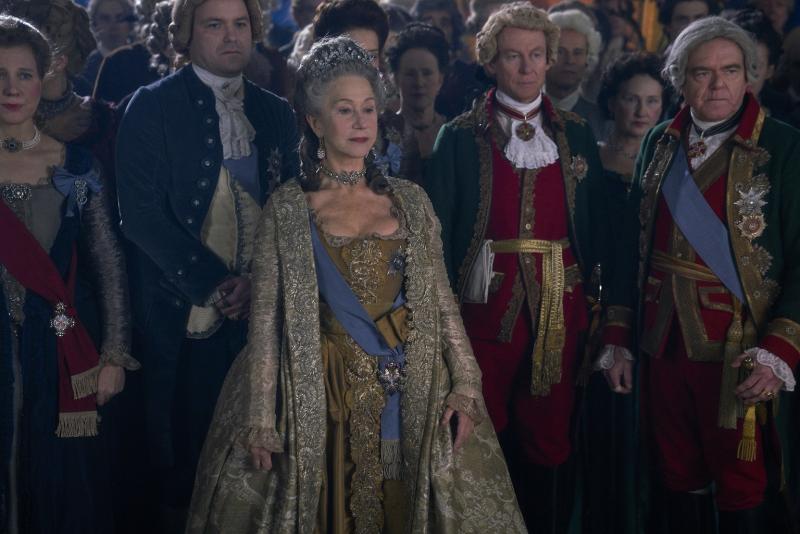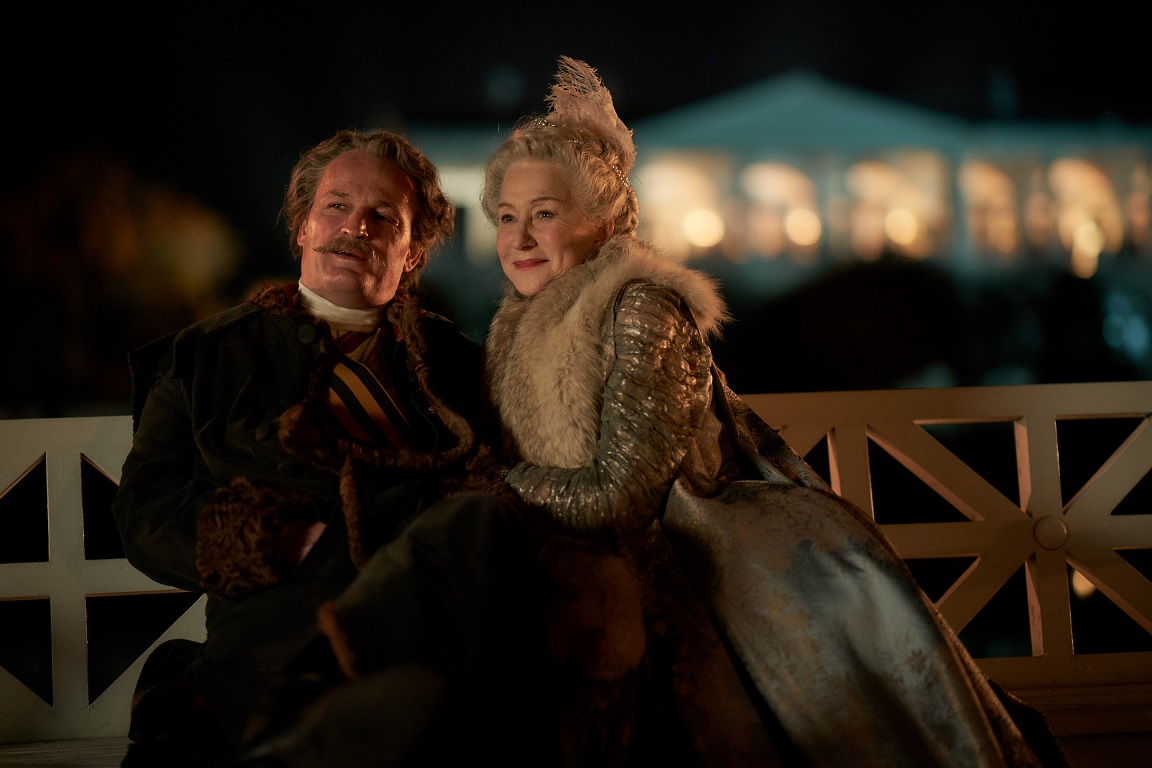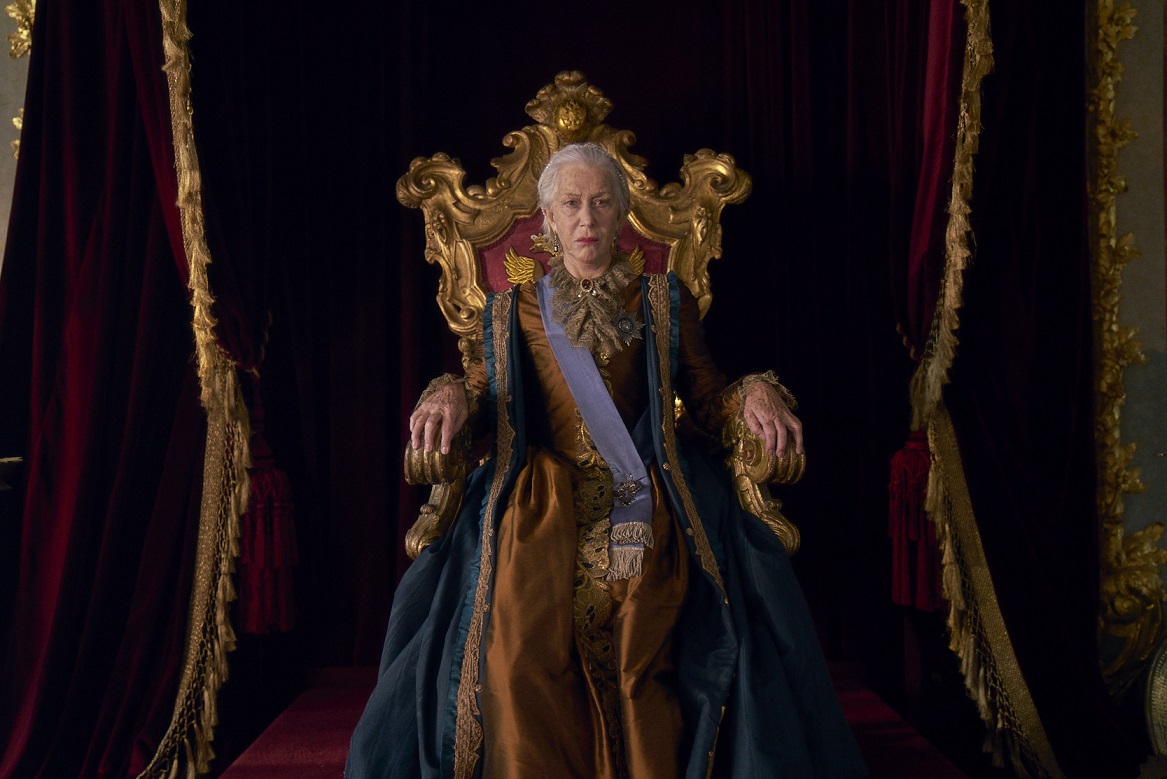Catherine the Great, Sky Atlantic review - a glorious role for Helen Mirren only gets better | reviews, news & interviews
Catherine the Great, Sky Atlantic review - a glorious role for Helen Mirren only gets better
Catherine the Great, Sky Atlantic review - a glorious role for Helen Mirren only gets better
Initial Russian intrigue may confound, but hold out for the emotional heart of a landmark drama

“I want something Russian…” It’s with such a cry that Helen Mirren, bored by the bizarrely transgressive masked ball that comes at the close of the first episode of Catherine the Great, gets the dancing going: nothing from the imported fashions of Europe will do for her, and the music duly strikes up, a soupily romantic melody on violin, the quintessence, you might think, of mythic "Russianness”.
There’s considerable irony, of course, that Mirren’s character, the titular Empress, was herself a German princess who married a Romanov and in due course became as Russian as any native, not least for how successfully she negotiated the Byzantine power play of court life to maintain herself unassailed for some four decades. (The fact that Mirren is herself half-Russian adds a nice twist.) Catherine the Great comes to us from the regal stable of director Philip Martin (The Crown) and writer Nigel Williams (Elizabeth I, another Mirren role, from whom Catherine might have taken lessons in how to retain power and independence in a man’s world). Cumulatively it’s very impressive television drama, going some way to convey the glorious contradictions of both Catherine herself and of her passionate relationship, enduring and multifarious, with her lover, Grigory Potemkin, under whose expansionist command Russia would become a European power to be reckoned with (the series surely tips some knowing hints towards the state of the country today).
There's a consciously modern sentiment to the production
Don’t be put off by the first episode, though: given that this ultimate power couple only really get to know one another towards the end of it, it somehow proves that their love interest really is what matters. Until then, we have court scheming combined with varying degrees of sexual adventure of a kind that wouldn’t look out of place in The Favourite, another 18th century court drama where winning the favour of the queen influenced the fate of the nation.
The creators of Catherine the Great bring a consciously modern sentiment to the production, of a kind that Yorgos Lanthimos would surely relish. This is no standard costume drama, the irony of its authorial viewpoint as striking as the richly vernacular language: the f-word is all over the place, reaching a particular later high point when Potemkin – Jason Clarke plays the role beautifully, really growing into it, even if you can’t help wondering what Depardieu would have made of it in his prime – explodes at his consort-of-sorts with a “Jesus fucking Christ!”. (The intonation of Cleese seems to hover in the air somewhere: Williams writes in a pronouncedly British rather than American idiom.) Catherine’s phrase on greeting her tricky allies, the Orlov brothers, at that cross-dressing ball, clearly isn’t out of the history books, either – “One of you looks like lesbian.” You have the impression that Mirren was enjoying herself thoroughly with the script, and it offers her treats like, “There are unscrupulous people in Russia – fortunately, I am one of them”. (Pictured below, Jason Clarke, Helen Mirren)  The historical circumstances that surrounded Catherine were, by any standards, extreme. Having deposed her husband, Peter III, with the assistance of the army (the Orlovs then conveniently did away with him), she’s being pressed to repay her debts, as well as contending against a coup that would have another contender to the throne installed on it (a subplot brought across here with a degree of dramatic cheesiness, all lurking conspiratorial glances). The loyalties of her son and heir Paul, who’s shortly to reach maturity, are in doubt – Catherine’s maternal bond is chillingly absent and she patronises him something rotten – a process abetted by her longstanding statesman aide Count Panin (Rory Kinnear). Completing the unpredictable setup, there’s the irrepressible Gina McKee as Catherine’s confidante Countess Bruce – she gets some cracking putdowns, too – one of whose demonstrations of loyalty to her imperial friend is to try out potential lovers in advance (she was known as l’eprouveuse). What with namedropping intellectual acquaintances such as Voltaire, not to mention trying to introduce liberal reforms to a reactionary Russian society that lived off its ownership of serfs, it’s no surprise that Helen Mirren’s multi-tasking skills seem somewhat stretched.
The historical circumstances that surrounded Catherine were, by any standards, extreme. Having deposed her husband, Peter III, with the assistance of the army (the Orlovs then conveniently did away with him), she’s being pressed to repay her debts, as well as contending against a coup that would have another contender to the throne installed on it (a subplot brought across here with a degree of dramatic cheesiness, all lurking conspiratorial glances). The loyalties of her son and heir Paul, who’s shortly to reach maturity, are in doubt – Catherine’s maternal bond is chillingly absent and she patronises him something rotten – a process abetted by her longstanding statesman aide Count Panin (Rory Kinnear). Completing the unpredictable setup, there’s the irrepressible Gina McKee as Catherine’s confidante Countess Bruce – she gets some cracking putdowns, too – one of whose demonstrations of loyalty to her imperial friend is to try out potential lovers in advance (she was known as l’eprouveuse). What with namedropping intellectual acquaintances such as Voltaire, not to mention trying to introduce liberal reforms to a reactionary Russian society that lived off its ownership of serfs, it’s no surprise that Helen Mirren’s multi-tasking skills seem somewhat stretched.
The real challenge facing Catherine, however, lies in maintaining her independence, without the obligation of taking a husband. Her variety of suitors, before Potemkin – and also during him: their relationship was characterised by a degree of polyamory that he himself occasionally directed, while she certainly enjoyed the youthful diversity as the years went on – expected that marriage to her would bring a surrender of authority to them. It’s a dynamic that plays out nicely as farce, as in a scene where Potemkin encounters Grigory Orlov (Richard Roxburgh) descending the staircase from Catherine’s bedchamber as he is climbing it, illustrates. Potemkin asks about news at court, to which Orlov replies, “Nothing in particular, except that you are going up and I am coming down.” But not long after that moment, in a complete rebalancing of mood, Catherine and Potemkin sit down for a scene of total unguarded sincerity, one that seems utterly contemporary in how it addresses the emotional balance of the relationship (pictured above, Helen Mirren in episode four). Mirren reveals herself absolutely and, from that point on, it becomes clear that this is a role that offers her virtually everything, from the parade of haughty, even petulant power to devastating vulnerability. Catherine the Great has a satisfying intricacy throughout, while the beauty and grandeur of its history certainly looks impressive – though battle scenes actually feel quite modest by comparison with some equivalent fare – but it’s the courageous truth at the heart of Mirren’s performance that sets it apart. All hail the Empress!
But not long after that moment, in a complete rebalancing of mood, Catherine and Potemkin sit down for a scene of total unguarded sincerity, one that seems utterly contemporary in how it addresses the emotional balance of the relationship (pictured above, Helen Mirren in episode four). Mirren reveals herself absolutely and, from that point on, it becomes clear that this is a role that offers her virtually everything, from the parade of haughty, even petulant power to devastating vulnerability. Catherine the Great has a satisfying intricacy throughout, while the beauty and grandeur of its history certainly looks impressive – though battle scenes actually feel quite modest by comparison with some equivalent fare – but it’s the courageous truth at the heart of Mirren’s performance that sets it apart. All hail the Empress!
rating
Share this article
The future of Arts Journalism
You can stop theartsdesk.com closing!
We urgently need financing to survive. Our fundraising drive has thus far raised £49,000 but we need to reach £100,000 or we will be forced to close. Please contribute here: https://gofund.me/c3f6033d
And if you can forward this information to anyone who might assist, we’d be grateful.

Subscribe to theartsdesk.com
Thank you for continuing to read our work on theartsdesk.com. For unlimited access to every article in its entirety, including our archive of more than 15,000 pieces, we're asking for £5 per month or £40 per year. We feel it's a very good deal, and hope you do too.
To take a subscription now simply click here.
And if you're looking for that extra gift for a friend or family member, why not treat them to a theartsdesk.com gift subscription?
more TV
 Coldwater, ITV1 review - horror and black comedy in the Highlands
Superb cast lights up David Ireland's cunning thriller
Coldwater, ITV1 review - horror and black comedy in the Highlands
Superb cast lights up David Ireland's cunning thriller
 Blu-ray: The Sweeney - Series One
Influential and entertaining 1970s police drama, handsomely restored
Blu-ray: The Sweeney - Series One
Influential and entertaining 1970s police drama, handsomely restored
 I Fought the Law, ITVX review - how an 800-year-old law was challenged and changed
Sheridan Smith's raw performance dominates ITV's new docudrama about injustice
I Fought the Law, ITVX review - how an 800-year-old law was challenged and changed
Sheridan Smith's raw performance dominates ITV's new docudrama about injustice
 The Paper, Sky Max review - a spinoff of the US Office worth waiting 20 years for
Perfectly judged recycling of the original's key elements, with a star turn at its heart
The Paper, Sky Max review - a spinoff of the US Office worth waiting 20 years for
Perfectly judged recycling of the original's key elements, with a star turn at its heart
 The Guest, BBC One review - be careful what you wish for
A terrific Eve Myles stars in addictive Welsh mystery
The Guest, BBC One review - be careful what you wish for
A terrific Eve Myles stars in addictive Welsh mystery
 theartsdesk Q&A: Suranne Jones on 'Hostage', power pants and politics
The star and producer talks about taking on the role of Prime Minister, wearing high heels and living in the public eye
theartsdesk Q&A: Suranne Jones on 'Hostage', power pants and politics
The star and producer talks about taking on the role of Prime Minister, wearing high heels and living in the public eye
 King & Conqueror, BBC One review - not many kicks in 1066
Turgid medieval drama leaves viewers in the dark
King & Conqueror, BBC One review - not many kicks in 1066
Turgid medieval drama leaves viewers in the dark
 Hostage, Netflix review - entente not-too-cordiale
Suranne Jones and Julie Delpy cross swords in confused political drama
Hostage, Netflix review - entente not-too-cordiale
Suranne Jones and Julie Delpy cross swords in confused political drama
 In Flight, Channel 4 review - drugs, thugs and Bulgarian gangsters
Katherine Kelly's flight attendant is battling a sea of troubles
In Flight, Channel 4 review - drugs, thugs and Bulgarian gangsters
Katherine Kelly's flight attendant is battling a sea of troubles
 Alien: Earth, Disney+ review - was this interstellar journey really necessary?
Noah Hawley's lavish sci-fi series brings Ridley Scott's monster back home
Alien: Earth, Disney+ review - was this interstellar journey really necessary?
Noah Hawley's lavish sci-fi series brings Ridley Scott's monster back home
 The Count of Monte Cristo, U&Drama review - silly telly for the silly season
Umpteenth incarnation of the Alexandre Dumas novel is no better than it should be
The Count of Monte Cristo, U&Drama review - silly telly for the silly season
Umpteenth incarnation of the Alexandre Dumas novel is no better than it should be
 The Narrow Road to the Deep North, BBC One review - love, death and hell on the Burma railway
Richard Flanagan's prize-winning novel becomes a gruelling TV series
The Narrow Road to the Deep North, BBC One review - love, death and hell on the Burma railway
Richard Flanagan's prize-winning novel becomes a gruelling TV series

Add comment